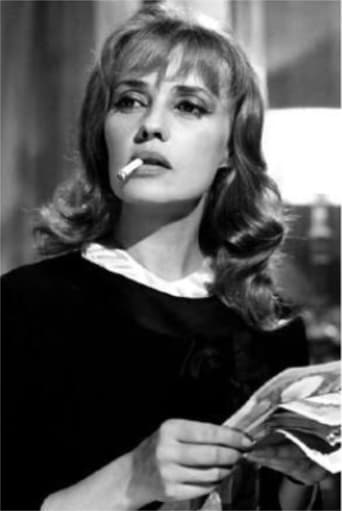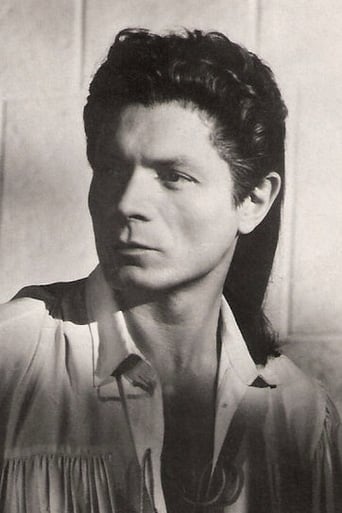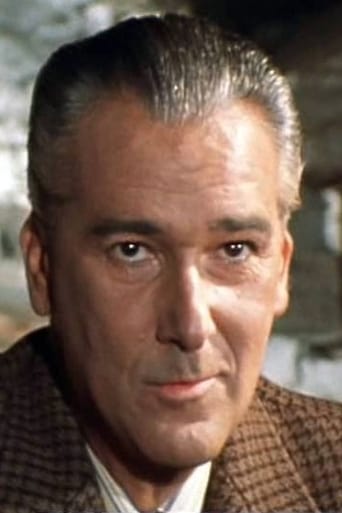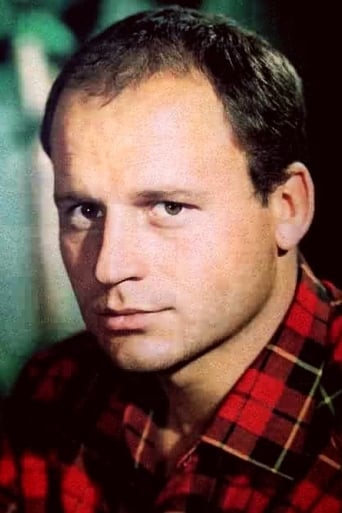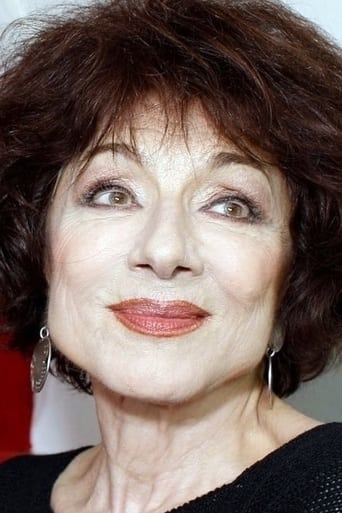Colibel
Terrible acting, screenplay and direction.
Smartorhypo
Highly Overrated But Still Good
Dorathen
Better Late Then Never
Livestonth
I am only giving this movie a 1 for the great cast, though I can't imagine what any of them were thinking. This movie was horrible
evening1
This film did not blow me away as it did so many others.One significant flaw is the utter lack of chemistry between Jeanne (Jeanne Moreau) and Bernard (the homely Jean-Marc Bory). Jeanne couldn't stop laughing at Bernard's calling her husband a bear? Pul-eeeeese! The sex scene, considered racy in 1958 -- even prompting the arrest of an Ohio theater owner -- looks tepid today. Even the drawn-out seduction scene elicits yawns. Jeanne's muumuu is more Grimms Brothers than Victoria's Secret. And, stretching out in that boat long abandoned in a bog? Ewww...cobwebs and creepy crawlers come to mind!A most distracting element to "The Lovers" is the moral vacuity of its leads. Presumably, Jeanne is not mentally diminished, and she had married Henri (Alain Cuny, clearly embodying one of film history's most thankless roles) of her own free will and not at gunpoint. She hasn't been married long (her daughter's small enough to be lifted) and she lives in the lap of luxury in Dijon, which, while it ain't Paree, boasts sumptuous grounds on a body of water and a retinue of servants to anticipate every need. Jeanne's husband works a lot, but hey, someone's gotta pay the bills. Still, the lady of the house is not content. So one day, she meets Bernard by happenstance, Bernard makes her laugh, Henri invites Bernard over, Jeanne and Bernard cavort when everyone else is asleep, and the two run away together -- without a word of farewell. Er, OK. We are told, as a coda, that Jeanne is afraid but has no regrets. That's nice. I guess the moral of this tale is: When you have a one-night stand, run away with him. He just might be your soul mate! OK, again, I guess. I admit I have long admired the work of Moreau. No one else can so believably pull off "hang-dog" and stunning at the same time.The voice-over narration in this film seems highly derivative of "Jules et Jim" -- yet that memorable film, directed not by Malle but Truffaut, came out four years after this one did! I don't want to end this review without citing the excellent work of Jose Luis de Vilallongo as the somewhat shallow but vulnerable playboy character, Raoul. The tenderness he shows toward Jeanne, and his sensitivity at the Tournier dining table, adds admirable depth and pathos to his character. "I love you because you are quite different," he murmurs to Jeanne, holding her closely while they dance -- "different from all the other women!" Now, that's romance. What woman wouldn't yearn to hear THOSE words? And you can bet Bernard won't be thinking them up...As a great poet opined, "What fools these mortals be."
dromasca
While Louis Malle was contemporary with the New Wave of the French cinema, he chose to use much more classical means of expression and is not considered to be part of movement. Yet, his films do have something different in their stylish approach to the life and romance of the French middle and upper class and this film is one of the best examples. He is closer to Bunuel than to Truffaut or Agnes Varda. Half a century after the controversy the film screening generated in the United States, half a century in which all taboos about representing sexuality on screen were broken, one wonders what is left of value in this film. The impression I was left with is pretty much mixed. The story has a level of simplicity and originality that I liked, with the bored provincial wife living a triangle life, but never satisfied emotionally and finding the true love by chance, in what we call today a one night stand. Yet all the nightly erotic setting seems unrealistic and the presence of a child left behind in the story leaves the viewer with a feeling of uneasiness. It is not that I am a moralist when it comes to judging movies, but the solution of what must be the harshest dilemma for a mother looks now and I believe looked then cheap. Jeanne Moreau is a fantastic actress and is at its best here, but the rest of the cast is far from her, with the exception maybe of Alain Cuny in the role of the husband. A few more style elements like using the music of Brahms or the love scene focusing on the face and ecstasy of the woman give the film a stylish look, but on the other hand the camera work did not survive well the passing of the time, or I may have seen a not to well kept copy and the off-screen commentary - probably from the 18th century original story that inspired the film - sound too didactic and non-cinematographic. Overall 'Les Amants' stays as a milestone in the history of the cinema but not necessary a good contemporary piece of entertainment for the viewer of today.
MisterWhiplash
Louis Malle had quite a running start in his mid-20's. Following the amazing noir feature Elevator at the Gallows- so hip and cool a film that Miles Davis himself did the score- Malle made The Lovers, a drama about a bored and unfulfilled housewife who has a one-night fling with a man she just met by the side of the road and decides to leave her husband and child for him. This is trivializing, of course, what is an incredibly potent and incredibly bittersweet tale that features a filmmaker so confident with his craft already that romance fills any scene that's required like a shotgun aimed directly at its target. When its at its best, The Lovers reminds us why we love watching people falling in love in the movies (or what the characters think in a moment of passion, as does happen in French films since they are some of the best at it), and as a kicker Malle adds a catch, something that elevates it from something more cynical in tone.The main character Jeanne, played by Jeanne Moreau, is married to Henri, who works well enough that she lives pretty much as a bourgeois. She also has a man on the side, a polo sportsman, and sees him from time to time at sort of programmed-to-be-fun locations like an amusement park. She's obviously unhappy, and one might find this looking at it today to look a little dated, like "oh, she's unhappy, she'll go find someone, I've seen this before." And, in fact, she does find someone else, or rather completely by accident or chance or whichever you'd be willing to pick. Her car breaks down on route to a dinner party with her husband and other friends, and a man, Bernard (Bory), a relative of someone in the bourgeois circle but not one himself, picks her up and drives her there. He is invited to dinner and stay the night, and it's here where we see the two have an incredible and deep connection.I should stop now since I've given away whatever sort of "plot" there is here. The Lovers is foremost a character piece, and Malle knows this so he makes it an incredibly rich film of character. We're not seeing just the basics of people like an unfaithful wife or hard-working and bitter husband or sweet woman best-friend to Jeanne or a stuffy Polo guy or even a dashing man out of the blue. There's a lot more nuance to it than that, more that's tucked under and given clarity by the little moments that threaten to shake everything up, be it just a fly in the room or a bat flying in through the window during dinner, or a mention of a time at an amusement park.One can have an moral problem with what Jeanne does, which is leaving her husband and child for a man she just met. Logically, it's absurd and wrong and all that jazz... but when it's filmed and presented like this, it becomes like a hyper-realistic tale, something that should be fantasy but is too real for these characters to pass off. Part of this is how it's filmed and timed. Henri Decae does the cinematography, and with one or two exceptions (in nit-pick fashion I spotted a boom mic in a couple of scenes that made me feel uneasy for such a highly regarded film, which of course passed), it's gorgeously filmed with light streaming in in that last third with Jeanne and Bernard in the garden and in the bedroom at night, given that hyper-realistic sensation that only happens in heightened romance in movies but made earthy and passionate because of the sincerity of the actors.The other part, I must mention, is Jeanne Moreau. She is one of the most captivating and desirable actresses in the past 50 years, but part of that is even as she is fairly young here (late 20s or just turning 30), something about her face looks older, more experienced in the world, weary. Maybe it's just for the character, but it's something about her that makes this and other parts she played in this star-making period so wonderful. Another actress might have made Jeanne look more unsympathetic. Moreau keeps us thinking about what her character may be thinking, disheartened by life and then rejuvenated by some possibility that terrifies her even more (watch her in the last couple of scenes, it's staggering work in the subtlest of ways), or if something with her character has made her react or feel a way that is only possible because she is playing it a certain way. There's magnetism to her here, which goes a great to making the "hot" scenes with her and her partner so memorable.It's precisely un-pornographic, as if I need to point it out following the Supreme Court's ruling that it was *not* pornographic precisely because the Judge "saw it as such", because of the filmmaker's connection and care for his characters even as they're doing possibly foolish and irreversible choices. It's liberating still 51 years later to see characters allowed to be this passionate and erotic on camera - whatever minor flaws, this has more love and lust going on than 2 dozen rom-coms in America as of late with usually not much regard to the way people actually react and think when thrown into romantic peril. At any rate, Happy Valentine's Day!
danielhsf
Louis Malle's Les Amants is the most romantic film ever made. Screw subjectivity and critical judgment. I've just come off fresh from seeing it, and, in the spirit of the film, I'll let my excitement wash over me instead of letting it die down to see it coolly. Seeing it gave me one of those precious moments, moments where you gasp and go oh-my-god, disbelieving your eyes that cinema could go to places like this, and make you feel things you never felt were possible in fiction.Buried within the Optimum Releasing of the Louis Malle box set, but it emerges the most deafeningly romantic, even when compared to the already celestial ending of the more famous Elevator to the Gallows. Its blissed out view on happiness makes it impossible to attach any critical adjectives to it; it requires us to suspend all thinking faculties and just go with that one powerful emotion.It's amazing how it turns what could've looked like a cover of a chick romance novel into something this beautiful. Henri Decae, who almost single-handedly created the first images of the New Wave, literally sets the screen aglow in ecstasy, painting the two lovers in a heavenly light in that pivotal centerpiece, which is one of the greatest moments of cinema, bar none. Even Jean Vigo's L'Atalante holds nothing on this. (There will be spoilers from hereon, and I would urge you to stop reading this paragraph if you've not seen the film. The joy of discovery in this film is so much more than any other film I've experienced, that I'm wholly convinced that one should experience this as fresh as a virgin.) Stripped of their daily pretenses and graces, the two lovers traverse a God-made Eden, becoming simply Man and Woman and reuniting again, several millenia after the First Man and First Woman were expulsed from paradise. When Jeanne Moreau takes Jean-Marc Bory's hand and asks him 'Is this the land you created for me to lose myself in?', the gaze is sealed and the viewer can do nothing but share in their passion. The two lovers become such eminent symbols of love, sex, and happiness that it's hard to imagine anything more sensual and erotic than this, especially when compared to the fully colored and fully exposed sex symbols of today. They belong to an era removed from any other, not the era that the film was made in, but a black-and-white, pristine era that exists only in cinema, one in which true love still exists without the moorings of reality.And the decided lack of moorings in this film is what makes it so bewitching. Whether it's the fleeting white horse or the eyes of the beautiful beautiful Jeanne Moreau, the film doesn't look back, but indulges fully in the moment, that moment of sensuousness. It is so fitting that the film should be called Les Amants, because anything else would be pretension - the lovers become the lovers of any era, any millennium, by their love alone they have been elevated to the great lovers that have long passed. They transcend being, nature, rules and become one - spirits entwined - with a world that is beyond the tangible, such that any rational reasoning will not be understanding. It's a magical world, a fantasy world, a world that is as unreal as we want it to be real. And this world, the film proposes, can only be reached through a temporary moment of love, un-selfish, immaterial, illogical, and unquestioning love. And when you're able to give yourself in, together with the film, it suddenly becomes so clear and not that unreal anymore.At the risk of sounding like a nut, I just wanted to recommend this film to everyone who thought that this century has made us cynical. Cinema, which began and evolved with this century, has rarely stepped out of its time so gloriously that it becomes a monument, a structure of those classical (and probably impossible) days. It is the single most ravishingly beautiful moment in the history of cinema.
